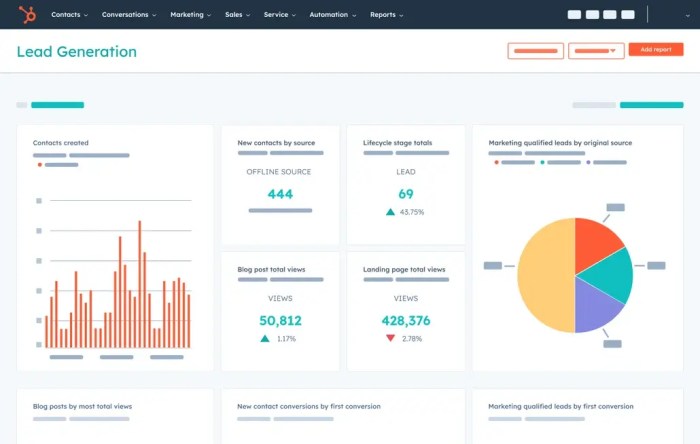Crm software for property management – The property management industry is dynamic, demanding efficiency and precision in handling numerous tasks simultaneously. From tenant communication and lease management to maintenance requests and financial tracking, the workload can be overwhelming. This is where Customer Relationship Management (CRM) software steps in, offering a centralized platform to manage all aspects of your property portfolio, boosting productivity and enhancing tenant satisfaction.
This comprehensive guide delves into the benefits, features, and considerations when choosing the right CRM software for your property management business.
Understanding the Role of CRM in Property Management
A CRM system for property management acts as a central hub, consolidating all your crucial data and interactions. Imagine having all tenant information, lease agreements, maintenance records, and financial details readily accessible in one place. This eliminates the chaos of scattered spreadsheets, emails, and physical files, allowing for smoother operations and better decision-making. Beyond simple data storage, a robust CRM system offers features designed to streamline various property management tasks, significantly improving efficiency and profitability.
Key Benefits of Implementing a Property Management CRM
- Improved Tenant Communication: Centralized communication channels enable quick and efficient responses to tenant inquiries, reducing response times and enhancing tenant satisfaction. Features like automated email and SMS notifications streamline communication for lease renewals, maintenance updates, and payment reminders.
- Enhanced Lead Management: Effectively manage leads from various sources, tracking their progress through the pipeline, and ensuring no potential tenant slips through the cracks. CRM systems often include lead scoring and automation features to prioritize high-potential leads.
- Streamlined Maintenance Management: Track maintenance requests, assign tasks to contractors, monitor progress, and manage expenses related to repairs and maintenance. This ensures timely resolution of issues and minimizes downtime.
- Simplified Lease Management: Manage lease agreements, track lease renewals, and automate rent collection processes. This reduces administrative burden and minimizes the risk of missed payments.
- Improved Financial Management: Track income and expenses, generate reports, and manage payments efficiently. This provides a clear overview of your financial performance and aids in better financial planning.
- Increased Productivity and Efficiency: By automating repetitive tasks and centralizing information, CRM systems free up valuable time for property managers to focus on strategic initiatives and building relationships with tenants and investors.
- Better Data Analysis and Reporting: Gain valuable insights into your business performance through comprehensive reporting and analytics features. This allows for data-driven decision-making and strategic planning.
Essential Features of a Property Management CRM
While the specific features may vary depending on the software, several core functionalities are essential for a successful property management CRM:
Core Features:, Crm software for property management
- Contact Management: Store and manage detailed information about tenants, landlords, contractors, and other stakeholders.
- Property Management: Track property details, including addresses, unit information, rental rates, and occupancy status.
- Lease Management: Manage lease agreements, track renewals, and automate rent collection.
- Maintenance Management: Track maintenance requests, assign tasks, and monitor progress.
- Financial Management: Track income, expenses, and generate financial reports.
- Communication Tools: Integrate email, SMS, and potentially even in-app messaging for seamless communication.
- Reporting and Analytics: Generate custom reports to track key performance indicators (KPIs) and gain valuable insights.
- Document Management: Store and manage important documents, such as lease agreements, maintenance records, and tenant applications.
- Integration Capabilities: Integrate with other essential tools like accounting software, marketing platforms, and payment gateways.
- Security and Access Control: Robust security measures to protect sensitive data and control access levels for different users.
Choosing the Right CRM for Your Needs
Selecting the right CRM involves careful consideration of your specific needs and budget. Factors to consider include:
- Number of properties managed: The scale of your operations will influence the features and capacity you require.
- Budget: CRM software comes with various pricing models, ranging from subscription-based to one-time purchases.
- Features and functionalities: Prioritize the features most relevant to your business needs and workflow.
- Ease of use and user interface: Choose a system that is intuitive and easy for your team to adopt.
- Scalability: Ensure the software can adapt to your growing business needs.
- Customer support: Reliable customer support is crucial for resolving issues and getting assistance when needed.
- Integrations: Check for compatibility with your existing software and tools.
Top CRM Software Options for Property Management
(Note: Specific software recommendations are omitted here to avoid bias and ensure the information remains current. Researching current market leaders and comparing their features is recommended.)
Frequently Asked Questions (FAQs): Crm Software For Property Management
- Q: What is the cost of property management CRM software? A: The cost varies greatly depending on the features, number of users, and provider. Expect a range from free (often with limited features) to several hundred dollars per month for more comprehensive solutions.
- Q: How long does it take to implement a CRM system? A: Implementation time depends on the complexity of the system and the size of your business. It can range from a few weeks to several months.
- Q: What are the key performance indicators (KPIs) to track with a CRM? A: Key KPIs include tenant satisfaction, lease renewal rates, maintenance response times, occupancy rates, and financial performance metrics.
- Q: Can a CRM integrate with my existing accounting software? A: Many CRMs offer integration capabilities with popular accounting software packages. Check the specific integrations offered by your chosen CRM.
- Q: Is cloud-based CRM software secure? A: Reputable cloud-based CRM providers employ robust security measures to protect your data. Look for providers with certifications and security protocols in place.
Conclusion
Implementing a CRM system is a strategic investment for property management businesses of all sizes. By streamlining operations, enhancing communication, and providing valuable insights, a well-chosen CRM can significantly improve efficiency, profitability, and tenant satisfaction. Take the time to research your options, carefully consider your specific needs, and choose a solution that will empower your business to thrive.
References
(Insert links to reputable sources on property management CRM software and best practices here. Examples could include industry publications, software vendor websites, and relevant research papers.)
Call to Action
Ready to transform your property management business? Explore the leading CRM solutions available today and discover how the right software can unlock your full potential. Contact us to discuss your specific needs and find the perfect CRM fit for your business!
Questions and Answers
What are the key features to look for in a property management CRM?

Source: turbotenant.com
Essential features include contact management, lease tracking, maintenance request management, communication tools (email, SMS), reporting and analytics, and ideally, integration with other property management software.
How much does CRM software for property management typically cost?
Pricing varies greatly depending on the features, number of users, and scale of the property portfolio. Expect to find options ranging from affordable monthly subscriptions to more enterprise-level solutions with higher costs.
Can CRM software integrate with my existing accounting software?
Many CRM systems offer integration capabilities with popular accounting software. This integration streamlines financial processes by automatically syncing data between the two systems.

Source: findmycrm.com
What kind of training is needed to use property management CRM software?
Most vendors provide training resources, ranging from online tutorials and documentation to personalized onboarding sessions. The complexity of the training will depend on the chosen software and the user’s technical proficiency.
